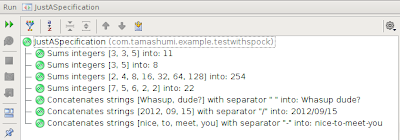Our Grails 2.1 application communicates with external SOAP WebServices. It worked fine as we follow Software Guy’s advices from this blog post.
Recently, our client required new functionality – export to Excel. We’ve used Apache POI libraries for export. And our web service communication died. All it gave us was:
Caused by: java.lang.LinkageError: loader constraint violation: when resolving field "DATETIME" the class loader (instance of org/codehaus/groovy/grails/cli/support/GrailsRootLoader) of the referring class, javax/xml/datatype/DatatypeConstants, and the class loader (instance of <bootloader>) for the field's resolved type, ants, have different Class objects for that type</bootloader>
This message is strange, LinkageError can give you creeps. But read carefully: resolved type, ants? Something is definitely wrong here. After many searches it turned out that Java 7 already contains some conflicting classes from stax-api.jar. To solve this problem there are two thing you need to do:
- Ensure that your jaxws-rt dependency is runtime, not compile! // http://asoftwareguy.com/2012/02/25/web-service-clients-where-grails-lost-its-mojo/
// Do not remove this dependency. Web services need this to work flawlessly.
runtime (‘com.sun.xml.ws:jaxws-rt:2.1.4’) - Create dependency report (
grails dependency-report), search and exclude all stax-api dependencies other than jaxws-rt like this example:compile ('org.apache.poi:poi-ooxml-3.7') { excludes 'stax-api' } compile ('org.apache.poi:poi-ooxml-schemas:3.7') { excludes 'stax-api' }
 Couple of years ago I wasn't a big fan of unit testing. It was obvious to me that well prepared unit tests are crucial though. I didn't known why exactly crucial yet then. I just felt they are important. My disliking to write automation tests was mostly related to the effort necessary to prepare them. Also a spaghetti code was easily spotted in test sources.
Couple of years ago I wasn't a big fan of unit testing. It was obvious to me that well prepared unit tests are crucial though. I didn't known why exactly crucial yet then. I just felt they are important. My disliking to write automation tests was mostly related to the effort necessary to prepare them. Also a spaghetti code was easily spotted in test sources.
